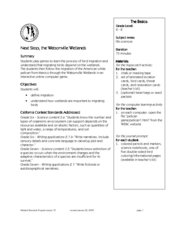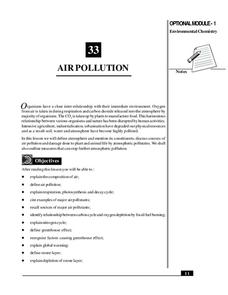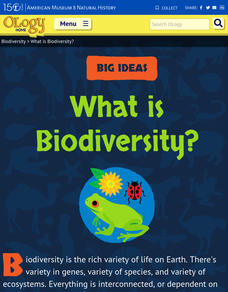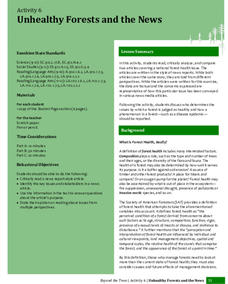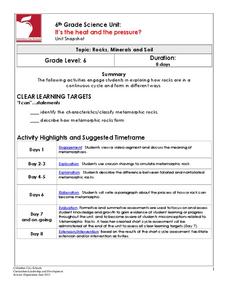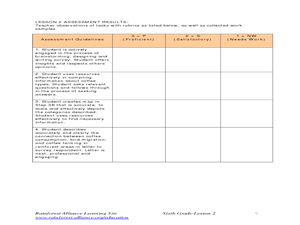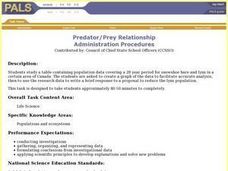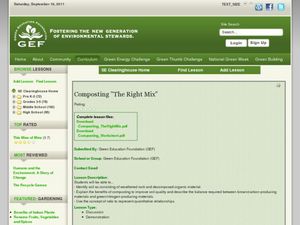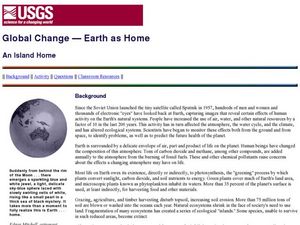Curated OER
Next Stop, the Watsonville Wetlands
Students study bird migrations and the importance of wetlands. In this migration lesson students play a game and complete a computer activity.
Curated OER
Where Do Birds Live? Cavity Nesters of the Watsonville Wetlands
Students compare and contrast primary and secondary cavity nesters. In this life science lesson plan, students explore the different types of nests that birds make. They play a team game to apply what they learned.
Curated OER
Build an Outdoor Compost Heap
Students study how to create a compost heap. For this composting lesson, students create a compost heap. Students write an essay describing the process.
National Institute of Open Schooling
Air Pollution
Seventy percent of the air pollution in China is due to car exhaust. Under the umbrella of environmental chemistry, learners extensively explore air pollution. From the makeup of our atmosphere to sources of major air pollutants, classes...
American Museum of Natural History
What is Biodiversity?
Not all dogs are the same just like not all finches are the same. An interactive online lesson helps individuals learn about the causes and limitations to biodiversity. The clickable sections describe the basics of the genetics of...
University of Florida
Unhealthy Forests and the News
Everyone knows a tree makes a sound when it falls, but what do we know about dying trees? Class members learn background information about Laurel wilt disease from a teacher-led presentation. Team members work with partners to read and...
Starry Night Education
Comets and Meteors
Comets are also known as dirty snowballs or icy mud balls. With your super scientists, create a model comet nucleus to discover how they are made and take part in a scientific discussion to learn how it behaves.
Marine Institute
Water Pollution
Sixth graders investigate the various types of pollutants found in water and ways to help prevent water pollution. Through a hands-on experiment, learners create samples of polluted water by mixing water with vegetable oil, dirt,...
Columbus City Schools
It's the Heat and the Pressure?
Ready for a change? Give a comprehensive collection of metamorphic materials a try! With the assortment of printables and lab activities, you won't be under pressure to keep things lively. The unit culminates by having...
Curated OER
Whose Breakfast isn't for the Birds?
Students explore coffee production. In this cross-curriculum rainforest ecology lesson, students research regions where coffee comes from and investigate how the native birds in the rainforest are effected by coffee...
Curated OER
Factors Affecting Plant Growth
Students determine the physical and chemical factors that affect plant growth. In this biology activity, students explain the role of hormones in plants. They investigate how competition with other plants affect their growth.
Curated OER
Earth & Beyond: Dryland Salinisation
In this earth and beyond worksheet, students read information about dryland salinsation, a serious problem facing Western Australia, and then answer 14 questions about the topic.
Curated OER
Everyone Up!
Students examine various agriculture careers, both direct and indirect, related to crop production and distribution. In this food production lesson, students role play the processing chain in which crops move from producer to processor...
Curated OER
Predator/Prey Relationship
Middle schoolers study and analyze data collected on the relationship between the snowshoe hare and lynx in Canada over a 28 year period and create a graph. Students also write a response to a proposal to reduce the lynx population.
Curated OER
The Captain And Lake Wilmar
Tenth graders examine the ecosystem of Lake Wilmar through three coordinated performance tasks. They first investigate the effects of pH on freshwater animals by comparing the zooplankton counts from three different areas. They then...
Curated OER
How Hot is Too Hot?
Fifth graders use the scientific method to conduct experiments on the temperature effects on organisms. In this temperature effects on organisms lesson plan, 5th graders observe and record the hatching or the developing of organisms into...
Curated OER
Saving the Bay
Students investigate water pollution prevention. In this ecology wastewater lesson, students activate prior knowledge about sewage, then view a video explaining the waste water sewage system used in the San Francisco Bay area. Students...
Curated OER
Sounds of the Wetlands
Learners identify the sounds of different bird calls. In this biology lesson, students create a sound map. They explain how this method is important in tracking wildlife.
Curated OER
Composting "The Right Mix"
Students investigate the correct mix of material types for compost. In this composting lesson, students explore the correct amounts of different types of materials to create a compost heap. Students then create a compost heap.
Curated OER
Weather Lesson 1
Students describe and compare the layers of the atmosphere. They explain how to measure the temperature of the atmosphere. They also explain what causes the atmosphere to heat up in some places more than in others.
Curated OER
Causal Patterns in Ecosystems Section 3
Students design and create a worm and worm free compost tanks for observation of decay in ecosystems. They make predictions, care, and revist tanks using their journals for observation and data collection.
Curated OER
Rock Cycles, Crayon Cycles
Students examine the rock cycle and the path that rocks go through to rearranged in different ways. They define key vocabulary terms, then in small groups conduct a variety of experiments using crayon shavings as simulated rocks and...
Curated OER
Experimental Design Practice
In this experimental design instructional activity, students are given two experimental scenarios to read. They answer questions about each including finding the hypothesis, the independent and dependent variables and controls. They...
Curated OER
Global Change- Earth as Home
Students create their own environment. In this environmental protection lesson, students pretend they are the owners of a tropical island. They create jobs for the citizens and develop the island as a model environment.
Other popular searches
- Edible Soil Profile
- Soil Composition Tests
- Soil Composition & Erosion
- Soil Composition Peculation
- Esl Soil Composition
- Soil Composition Worksheets
- Soil Composition Perculation
- Soil Composition Management
- Soil Profile Demonstrations
- Soil Profile Introduction
- Soil Profile Lesson Plans
- Soil Profile Diagram


